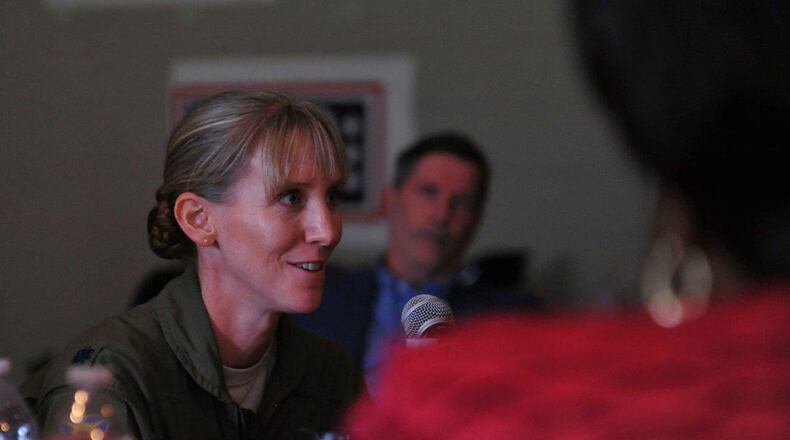To set the tone for the discussion, Tech. Sgt. Patrice Earl, the event moderator, opened with a brief overview of the history of the Women’s Rights Movement in the United States and introduced the panelists. Around the table sat Lt. Col. Olivia Elliot, A-10 pilot; Gail Forest, Air Force Materiel Command director of Engineering and Technical Management; Janet Wirth, 88th Air Base Wing vice director; Chief Master Sgt. Tynisha Haskins, AFMC Paralegal manager; and Tech Sgt. Brittany Johnson, 375th Aeromedical Evacuation Training Squadron commanders support staff.
To head off the conversation, Earl spoke briefly about herself and her upbringing and offered the panelists the opportunity to do the same. Following these introductions, conversations moved on to topics like equality in the workplace and navigating male-dominated career fields.
Wirth spoke about her early job working as a fast food manager and deciding in her early 20s that she wanted to go to college. After receiving her degree, she was accepted into a management training program at Wright-Patterson where she discovered her true passion.
“I knew as soon as I walked on the base that I wanted to be a leader,” she said.
A self-described introvert, Wirth explained the importance of rising to meet the needs of a job and feeling empowered to do so.
Forest talked about attending engineering school immediately after high school at an institution that had only started admitting females four years prior. She described issues with being taken seriously and being seen as an equal.
“You were looked at like you were only there to find a husband. Which was the furthest thing from my mind,” she said.
Elliott shared with the group an early experience that launched her into pursuing a career as a fighter pilot. When at age 16, she approached a recruiter for the Naval Academy with questions on how she could gain admission, she was told in certain terms that the academy was heavily based in math, science and engineering and that she should aim for a civilian institution where she could study liberal arts.
“From that moment on I decided that I will never ever let somebody look at me and say, ‘You can’t do that,’” Elliott said.
Johnson shifted the conversation to another prevalent topic in society, the wage gap.
“Because we are women of the armed forces, we don’t have to worry about being shorted pay compared to our male counterparts; however, there are civilian women that deal with this on a daily basis,” she explained.
Johnson shared a story about her sister who, while working for an insurance company, discovered that she was given a much lower starting salary than one of her male coworkers despite having seniority over him.
Haskins touched on the future of the women’s equality movement.
“I think the perspective is different. I think the fight is different,” she said.
She described the key differences between past and present generations on the potential for leadership that will lead to a more equal future for women.
“If you expose them to things that they can do, if they see that other people are doing it, there’s possibility. Maybe in (previous) generations there wasn’t perceived possibility, but there is a definite possibility now,” Haskins said.
The hour-long discussion focused on many of the pressing issues that women face today in the workplace and in society. Following the roundtable, attendees and panelists spoke more about their experiences with one another, encouraging these conversations to span beyond Women’s Equality Day.
To close the event, Earl left attendees with a final thought.
“We must continue to empower and uplift each other, break down doors and open new ones for the women after us,” she said.
About the Author
